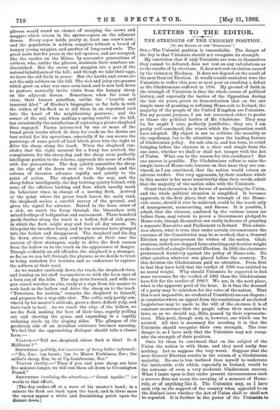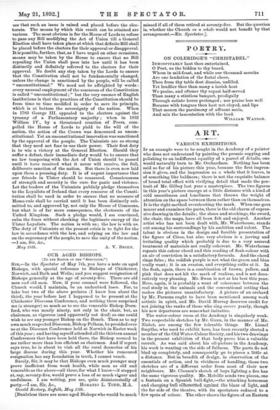LETTERS TO THE EDITOR.
THE STRENGTH OF THE UNIONIST POSITION.
[To THE Bonos OF THE "SPECTATOR:]
SIR,—The Unionist position is unassailable. The danger of the day is that Unionists should not recognise its strength.
My conviction that if only Unionists are true to themselve& they cannot be defeated, does not rest on any calculations as to the results of by-elections. It does not rest on elation caused by the victory at Hackney. It does not depend on the result of the next General Election. It would remain unshaken were the. Unionists to suffer this year or next year as crushing a defeat as the Gladstonians suffered in 1886. My ground of faith in the triumph of Unionism is that the whole course of political history, and especially the tactics of the Opposition during the last six years, prove to demonstration that on the one simple issue of granting or refusing Home-rule to Ireland, the majority of the people of the United Kingdom are Unionists. For my present purpose, I am not concerned either to praise- or blame the political tactics of Mr. Gladstone. They may be, for aught I care, perfectly justifiable; they are, I am pretty well convinced, the wisest which the Opposition could have adopted. My object is not to criticise the morality or the expediency, but to fix attention upon the leading feature of Gladstonian policy. Its sole aim is, and has been, to avoid bringing before the electors in a clear and simple form the one issue, whether we shall or shall not tamper with the Act of Union. What can be the reason for this avoidance ? But. one answer is possible. The Gladstonians refuse to raise the simple issue of Home-rule, because on that issue they are con- vinced, as I am convinced, that the nation would return an adverse verdict. Our very opponents, by their conduct, which in this matter is far more trustworthy than their words, admit. that the majority of the nation sides with the Unionists.
Grant that the nation is in favour of maintaining the Union, and the whole political situation is simplified. It becomes- apparent, in the first place, that the triumph of the Home- rule cause, should it ever be achieved, could be the result only of management, manceuvring, and finesse. It is possible, I admit, that the electors, confused by the various issues set before them, may return to power a Government pledged to. Home-rule, though themselves not really in favour of granting- a separate Executive and Parliament to Ireland. This admis- sion shows, what is true, that under certain circumstances the customs of the Constitution may be so worked, that a General Election may misrepresent the wishes of the nation. Glad- stonians, indeed, are stopped from attaching any decisive weight to the result of a single General Election. In 1886, the electorate pronounced decisively against the policy of Home-rule. No. other question whatever was placed before the country. To- this decision the Gladstonians paid no attention. From first. to last they have held that the verdict of 1886 was entitled to- no moral weight. Why should Unionists be expected to feel more reverence for the verdict of 1892 than the Gladstonians have felt for the verdict of 1886? We see, in the next place, what is the apparent peril of the hour. It is that the demand of a party may be mistaken for the voice of the nation. That this is not impossible, no student of Constitutions can dispute .t in countries where an appeal from the resolutions of an elected Legislature may be made to the will of the electors, it is of constant occurrence that the people refuse their sanction to. laws, or, as we should say, Bills, passed by their representa- tives. This peril, though real, is, however, one which can be averted. All that is necessary for averting it is that the Unionists should recognise their own strength. The true danger is, as I have said, that the Unionists may not recog- nise the strength of their position.
Once let them be convinced that on the subject of the Union the nation is with them, and they need really fear nothing. Let us suppose the very worst. Suppose that the next General Election results in the return of a Gladstonian majority. No one is less inclined than myself to underrate the intolerable evils which, especially in Ireland, would be the outcome of even a very moderate Gladstonian success. What I insist upon is that under present circumstances such a success does not mean the carrying of a measure of Home- rule, or of anything like it. The Unionists may, as I have
said, rely on the support of the country when appealed to. on the distinct issue whether the Act of Union shall or shall not be repealed. It is further in the power of the 'nick' nista to see that such an issue is raised and placed before the elec- torate. The means by which this result can be attained are various. The most obvious is for the House of Lords to refuse to pass any Bill modifying the Act of Union till a General Election shall have taken place at which that definite Bill shall be placed before the electors for their approval or disapproval. It is possible, further, that, as I have urged on other occasions, means may be taken by the House to ensure that no Bill repealing the Union shall pass into law until it has been distinctly and definitely referred to the electors for their approval. No doubt any step taken by the Lords to ensure that the Constitution shall not be fundamentally changed, unless the change is sanctioned by the people, will be called "unconstitutional." We need not be affrighted by words : every unusual employment of the resources of the Constitution is called "unconstitutional ; " but the very essence of English institutions is that the practices of the Constitution should be from time to time modified in order to save its principle, which is at bottom the sovereignty of the nation. When in 1783 George III. appealed to the electors against the tyranny of a Parliamentary majority ; when in 1832 William IV., by a threatened creation of Peers, com- pelled the House of Lords to yield to the will of the nation, the action of the Crown was denounced as uncon- stitutional. Yet an unconstitutional innovation was sanctioned by the approval of the people. The Unionists are so strong that they need not fear to use their power. Their first duty is to win a victory at the General Election. Should they suffer a defeat, their immediate duty would be to ensure that no law tampering with the Act of Union should be passed until it have received what it never will receive, the fall, deliberate sanction of the nation. But there is even now laid upon them a pressing duty. It is of urgent importance that our friends in Ulster should be reassured. Consciousness of strength and security is the cure for panic and violence. Let the leaders of the Unionists publicly pledge themselves to the Loyalists of Ireland that every resource of the Consti- tution shall be used in order to ensure that no measure of Home-rule shall be carried until it has been distinctly sub- mitted to, and approved by, not only the House of Commons, but what is of far more consequence, the electorate of the 'United Kingdom. Such a pledge would, I am convinced, calm the fears without checking the legitimate energy of the Ulster Loyalists. The nation is with us ; the law is with us. The duty of Unionists at the present crisis is to fight for the law in accordance with the law, and relying on the law and on the supremacy of the people, to save the unity of the nation. —I am, Sir, &c.,



































 Previous page
Previous page